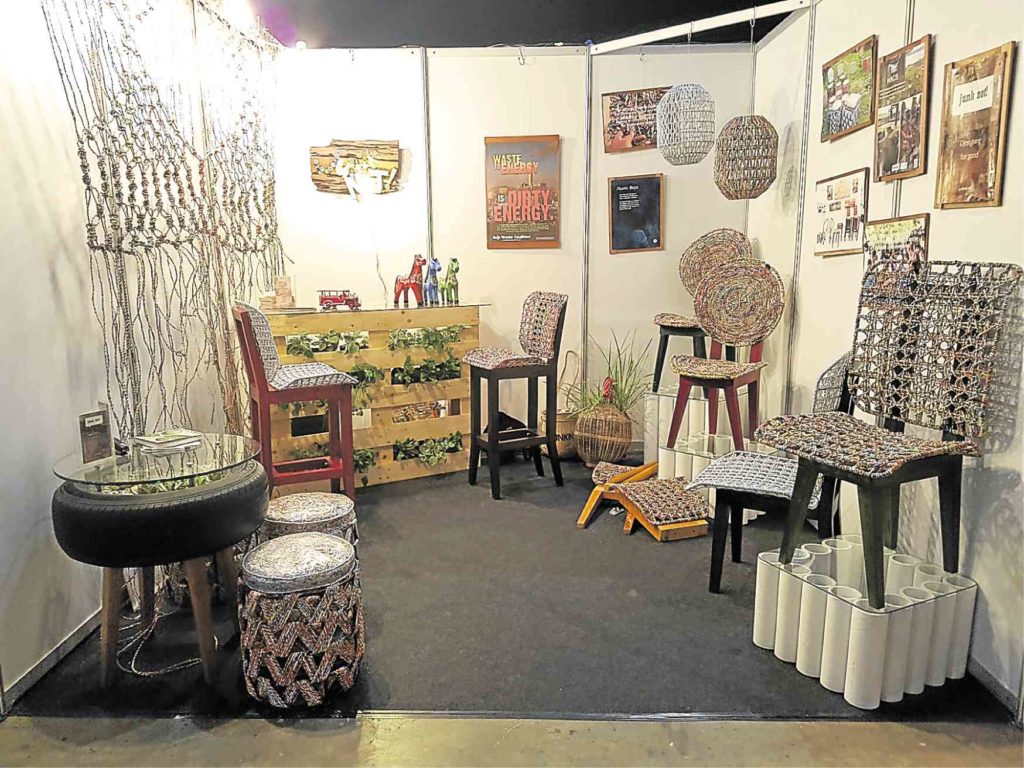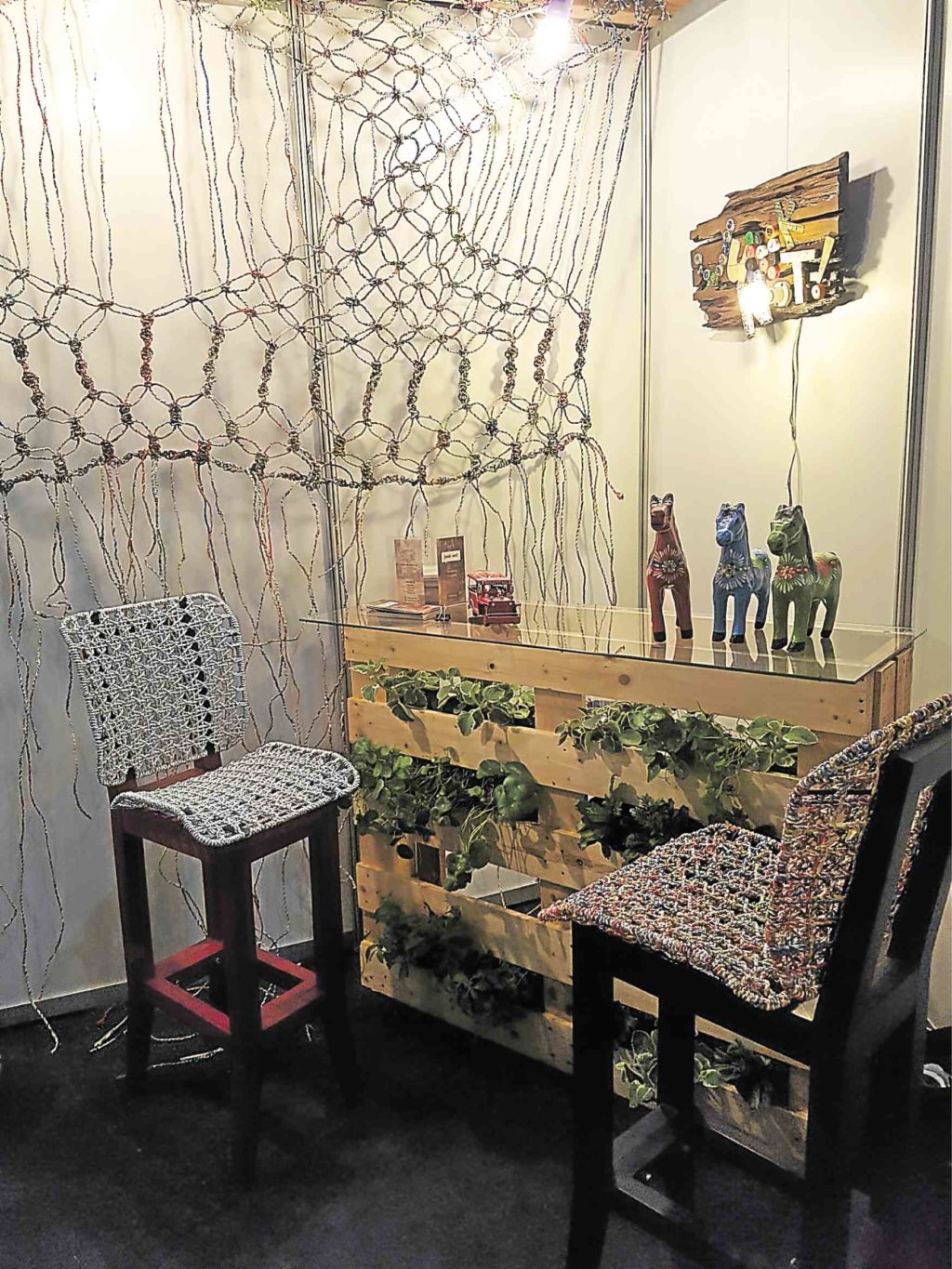Designer wages war versus plastic waste

Wilhelmina Garcia is helping protect the environment by making unique furniture pieces out of plastic. —PHOTOS FROM JUNKNOT
Three years ago, in a three-meter-by-three-meter studio in Morocco, Filipino interior designer and eco-activist Wilhelmina Garcia found herself at a crossroads in her business venture: It had been five years since she co-founded JunkNot Eco Creatives, a social enterprise that made bags and fashion accessories from plastic waste, and it was barely breaking even.
At that moment, in September 2014, Garcia was in an artisan residency program in Sefrou, a small city in the Fez-Meknes region, where she would stay for a month to learn or perfect a craft.
“I was just sitting there, staring at the white walls, thinking, ‘what am I going to do? Why am I even here?’” she said. “And then it dawned on me: Enough with the bags already; I am going to make a chair.”
Garcia commissioned a local artisan in Morocco to build a frame for a stool while she went about town, picking up discarded foil packaging for her final project as an artisan resident under Culture Vultures.
It was to be her piece for the artisan’s exhibit.
“The locals would laugh at me because I was picking up trash. They were telling me how dirty it was. They called me ‘Manila.’ I told them I did this in my country, too,” she said.
When Garcia finished her silver stool using ropes fashioned from plastic waste, everyone was amazed at the way trash was transformed.
Her fellow artisans and teachers were inspired to do a river cleanup with the community, and from what they gathered, Garcia made another chair that she left in Morocco.
“I’ve made chairs in the past for my brother’s Balikbukid restaurant in Davao, but I used a different technique then, which took too long. I wanted something that I could easily teach to a community. Otherwise, it will just be stock knowledge,” she said. “It was in Morocco that I was really able to focus and experiment with the techniques and later on, the patterns.”
The stools she made in Morocco not only garnered praise from fellow artisans, they also breathed new life into
JunkNot’s future as a social enterprise. They began what would become the brand’s furniture line.
In October 2015, JunkNot officially launched its “Bangko” and “Jeepney” chairs at the Manila FAME, a bi-annual trade show that promotes the best Philippine-made products, mostly to international buyers. The chairs were instant hits.
“I put in a lot of money in the bag business. It was not profitable but I did it anyway because I was happy helping communities, and I wanted to help address the country’s plastic waste problem,” Garcia said.
Plastic from partners
The Philippines is the third biggest ocean polluter in the world, releasing 521,000 tons of plastic waste into bodies of water every year, according to a 2015 report by Ocean Conservancy and McKinsey Center for Business and Environment.
JunkNot was Garcia’s contribution to addressing the country’s plastic waste problem .
“But I could not compete in the bag market—it seemed everyone was doing the same thing with plastic: Bags, purses, accessories. Then I thought, ‘I’m an interior designer, why am I competing in fashion?’ So I decided to try furniture. I’m probably the first to make chairs using plastic waste,” said Garcia.
Dubbed by a local design magazine as one of the Philippines’ “25 creatives to watch,” Garcia is a familiar figure in the country’s upcycling circle. She is often tapped by local governments and non-government organizations to teach poor communities various means of livelihood.
With JunkNot, she remains committed to reducing plastic waste and helping communities, but this time, Garcia wants it to be sustainable as a business as well.
To do that, she had to change the production flow. Instead of relying completely on the communities to make the products, she now only taps them for raw materials.
“It was difficult because in the communities, they only worked when they had the time, or when they felt like it. Some groups were lazier than others. It affected the production flow,” she said.
“With the furniture line, the communities only provide the raw materials, and I have people who make the chairs and tables in my workshop in Laguna. They were also trained by me,” she said.
For the raw materials, JunkNot partnered with the residents of Barangay Alas-as in San Nicolas, Batangas—the same people Garcia trained in early 2015 as part of a project of the Department of Environment and Natural Resources.
She taught them to make ropes from big foil packaging, such as bags of chips, and to cut the smaller packaging, such as candy wrappers, so they can be used as fillers for chairs.
“When I presented the project, only four women responded. Now, there are more than 60 of them because they saw that the four were making money,” Garcia said.
Paris and beyond
Since she started JunkNot’s furniture line, Garcia has furnished an entire office in Alabang with pieces made from plastic ropes such as office dividers, desks and chairs. She has also been tapped to do the interiors of the Negosyo Centers of the Department of Trade and Industry in Laguna.
“Our business model is still evolving but there’s definitely profit-sharing with the community. Right now, they get 5 percent,” Garcia said. “That’s why I keep reminding them that we are partners. If they produce low-quality raw materials, it will be hard for me to sell the pieces, which means low income for them.”
This September, exactly three years since her epiphany in Morocco, Garcia will be traveling thousands of miles again, this time to Paris, with her bestselling “Bangko” and “Jeepney” chairs.
She will join a crop of “new and emerging design talents” from all over the world who were selected to showcase their innovative creations at the Paris Design Week on Sept. 8 to 16.
The chairs will be featured in the Now! Le Off exhibition, one of the highlights of the design event, which will be held in 180 venues across Paris. The repurposed plastic products will also be her entry to the Rado Design Prize 2017.
After Paris, the chairs will be off to Belgium for the eco-festival Conscienza 2017, where Garcia was also invited to participate.
“I’m really excited to do this. The furniture line has done so much better than the bag business, and I think it will continue to do well,” she said.















